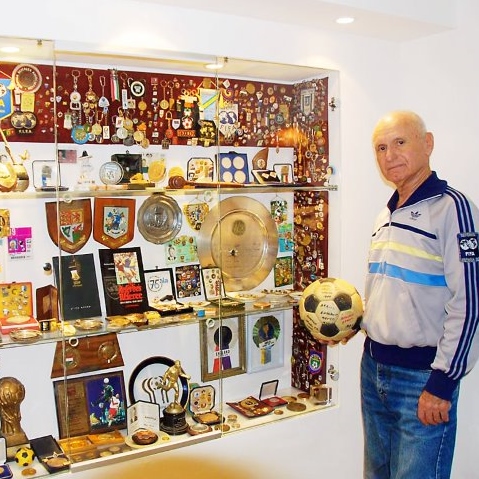
SA

Klein donates football collection to Fifa museum
JACK MILNER
He made his World Cup debut in 1970, at one of the tournament’s most famous matches, as a young, total unknown.
He missed the 1974 World Cup because of the Munich massacre of his fellow Israelis two years earlier. He was scandalously deprived of the World Cup final of 1978, punished for his own scrupulous excellence by sticking to rules when hosts Argentina lost 1-0 to Italy.
He ran the line in the 1982 World Cup while not knowing whether his son, who was fighting in Lebanon for the Israeli army, was alive or dead.
Last week Klein presented items from his personal collection to the Fifa World Football Museum in an emotional ceremony in Zurich. Klein, who officiated at three World Cup tournaments, retired 35 years ago after serving as one of the most senior soccer referees in the world.
The items in the collection include whistles he used during the World Cup in Mexico in 1970 and in Argentina in 1978, and soccer balls used in some of the most important games in the sport’s history, including Brazil v England in the 1970 World Cup and Brazil v Italy in the World Cup in Spain in 1982.
Senior officials from the Israeli Embassy in Switzerland, were among those who attended the ceremony, as well as Fifa representatives, heads of the local Jewish community, the chairman of the Israel Referees Association, Uzi Yitzhaki, and former Polish referee Michal Listkiewicz, who is now the supervisor of referees at Fifa.
“I stand before you today at this festive occasion, excited and happy. This event closes a circle in my career,” Klein said at the ceremony.
“It is a real privilege that my sports souvenir collection, which reflects and embodies decades of an international soccer career, found its most appropriate and deserving home, and will be housed forever in the hall of honour and glory of international soccer – the Fifa Museum.”
Klein’s rare collection includes over 1 000 items like balls, whistles, red and yellow cards, flags, emblems, ties, referee uniforms and more. Klein is not a professional collector, but he didn’t throw anything away.
Klein was not supposed to be a referee. He loved football and wanted to be a footballer, but was not up to that standard. In his autobiography, The Whistle Artist, he tells how in the mid-50s, on a break from army duty, his parents sent him to buy some trousers from a tailor called Jonas. Jonas was about to leave to referee an amateur game. He told Klein to come with him, and that he would make his trousers after the match.
Jonas turned an ankle during the match. He asked Klein to step in. “I told him, ‘I don’t know the laws of the game’.
“So he said: ‘The laws of the game are very simple, it’s not university. Somebody make a foul, you whistle.’
“‘That’s all?’ That’s all the laws?’
“‘That’s enough for this game.’”
Klein showed such natural aptitude for refereeing, and such enjoyment of it, that he soon took the formal refereeing examinations. He caught up with Jonas more than two decades later. Jonas later moved to New York and found Klein among 60 000 people at a New York Cosmos game. “But,” said Klein, “he still didn’t have my trousers.”
The decision to allow Klein to referee the important Brazil v England match at the 1970 World Cup, was the subject of much controversy. However, Fifa knew he was fit enough to cope with Mexico’s oppressive heat and high altitude. But the players did not know who he was.
“In the first moment, they looked at me and you could see they were thinking: ‘Who is standing here in the middle of the field?’ They knew nothing about me. I tried from the first moment to respect the players; I looked into their eyes. A little later during the game they understood they must also respect my refereeing.”
He controlled the game calmly from the first whistle. It flowed gracefully from end to end, a festival of goodwill and mutual respect, and is still one of the World Cup’s iconic contests.
There were a couple of major incidents. Francis Lee was booked for a late challenge on the goalkeeper, Felix; then, just before half-time, Pele fell in the area after a challenge from Alan Mullery. It would have been so easy for a young referee to be seduced by the greatest player in the world. Klein simply waved play on. He later called it “the best decision of my life”.
His performance received universal praise. “It was a tough game,” said Pele, “but he always had total control of the action.” In his Story of the World Cup, Brian Glanville said the game was “admirably refereed by the obscure Israeli referee Abraham Klein, an inspired appointment”.
Unlike some of the other great referees, Klein did not have physical authority. He was 1,65m tall and weighed a fraction over 65 kg. But he could impose himself in other ways. He was a big believer in body language. It soon became apparent he did not suffer insolence or indiscipline.
Klein was paid £10 for refereeing the game. In the future he was lucky to get that; at the 1982 World Cup the referees were paid only expenses.
“Money for me was not important. To have a game like England-Brazil or Italy-Brazil, is much more than a million dollars. Believe me, if I had a million dollars at that time and they asked me if I want to pay a million dollars to referee Brazil v England, I would write a cheque.
“It changed my life.”




